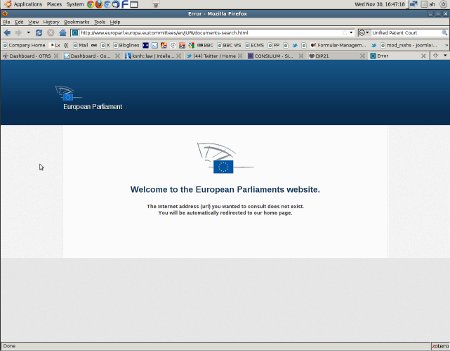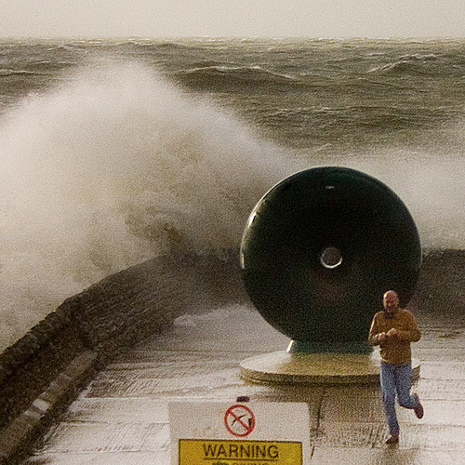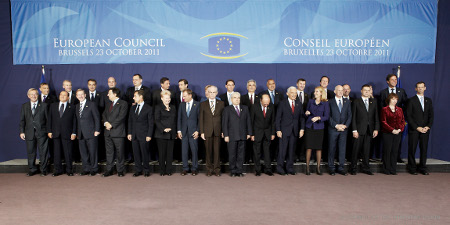 FICPI is one of the large international federations of IP attorneys. In its capacity as a professional representation especially of European Patent Attorneys and national Patent Attorneys in EPC/EU states in private practice, this “Position Paper on the Unitary Patent and the Unified Patent Court” has been prepared and submitted in support of profession’s and their client’s interests. The document carries the date of 3 December 2011 and has been submitted on 4 December (Sunday), i.e. one day before the decisive EU Council meeting on 5/6 Decmber (result see here) but, apparently, after the not less decisive meetings of the Legal Affairs Committee (JURI) of the EU Parliament in preparation of the Council meeting, so that the paper’s impact on the political process is probably limited.
FICPI is one of the large international federations of IP attorneys. In its capacity as a professional representation especially of European Patent Attorneys and national Patent Attorneys in EPC/EU states in private practice, this “Position Paper on the Unitary Patent and the Unified Patent Court” has been prepared and submitted in support of profession’s and their client’s interests. The document carries the date of 3 December 2011 and has been submitted on 4 December (Sunday), i.e. one day before the decisive EU Council meeting on 5/6 Decmber (result see here) but, apparently, after the not less decisive meetings of the Legal Affairs Committee (JURI) of the EU Parliament in preparation of the Council meeting, so that the paper’s impact on the political process is probably limited.
The position paper does not appear to be available via the FICPI website yet, but has been referred to in this tweet on @FICPI, demanding to “‘Go Slowly’ on Unitary Patent and Unified Patent Court” (see related press release).
On December 02, 2011, the General Secretariat of the EU Council sent to Permanent Representatives Committee (COREPER Part 1) Document 17407/11 titled Draft agreement on the Unified Patent Court – Relationship of the draft agreement on the Unified Patent Court with Regulation (EC) No 44/2001 Brussels I, originally classified LIMITE.
I was able to obtain a copy of that Document by means of a request in accordance with Article 15(3), third subparagraph, of the TFEU. Specific rules governing this kind of public access to Council documents are established in Annex II to the Council’s rules of procedure. These rules apply mutatis mutandis to European Council documents, as stipulated in Article 10(2) of the rules of procedure of the European Council.
In fact, Document 17407/11 conveys a non-paper from the Commission services dated November 30, 2011. The Commission services have considered the relationship of the draft agreement on the Unified Patent Court in the version of Council documents 16741/11 of November 11, 2011 and 17539/11 of November 24, 2011 with Regulation (EC) No 44/2001 on jurisdiction and the recognition and enforcement of judgments in civil and commercial matters (the Brussels I Regulation). The non-paper presents, to the extent possible, solutions to arrange that relationship in a legally sound and certain manner. The proposed solutions should be considered preliminary.
Of course, in the current situation problems concerning the relationship between the envisaged UPC agreement, on the one hand, and Bruisels I, on the other hand, clearly appear to be of lesser importance. However, these aspects surely contribute to the overall weight of problems to be resolved in principal before the intended ceremony on December 22, 2011, can take place in Warsaw.
Continue reading »
After the EU Competitive Council’s debate on the EU Patent Package (Regulation covering the Unitary Patent and its Language Regime and an international treaty covering the Unified Patent Court) ended Monday night, a nightly press report explained that only a few more days were needed to reach an agreement on the whole package, while the negotiators of the Polish Presidency added that “only the seat of the Central Division of the Unitary Patent Court needs to be decided”.
Before the Council meeting London and Munich were said to be the favourite cities for hosting the seat of the 1st Instance Central Division (see here or here), while Luxembourg was set for the seat of the 2nd Instance Court of Appeal since the home of the European Court of Justice (CJEU) for some reason was the only candidate for hosting this authority. Immediately after the meeting it was reported that the German and UK delegations objected to the Presidency’s compromise suggestion to have the “seat of the main litigation court for the upcoming EU patent” in Paris (see details here or here).
Since then the it looks like the candidate list changes constantly, as further candidates appear to throw down their gauntlet in the competition to host the Central Division, while others may have minimised their chances due to very recent political moves.
Parallel to these negotiations speculations sprout up that Italy and maybe also Spain might abandon their resistance against becoming a member state of the Unitary Patent. Especially in the case of Italy – now governed by pro-Europe Prime Minister Mario Monti who actively supported the Unitary Patent (see e.g. EU press releases IP/97/558 of 6/97 or IP/99/105 of 2/99) when he was a member of the European Commission from 1994 to 2004, first as Commissioner for the Internal Market (and thus predecessor of Michel Barnier who currently is in charge of the patent reform) and then as Commissioner for Competition – such rumours were reinforced by Mr Pierre Delsaux, deputy director general under Commissioner Barnier, who was reported to have revealed that Mario Monti is in fact considering joining the unitary system (see also tweet).
Monday’s Competitive Council meeting under the Polish Presidency (Chair: Waldemar Pawlak, Deputy Prime Minister and Minister of Economy of Poland) was intended to finalise the EU Patent Package (i.e. a EU regulation covering the Unitary Patent and the its language regime and an international agreement on the Unified Patent Court). Right after the meeting it appead that, based on a compromise proposal by the Presidency, this aim was missed only by a faily small margin since, as was explained in a nightly press release
[...] The debate took place on the basis of a compromise package drawn up by the Presidency. The compromise was broadly accepted in substance, but the debate showed that further work is still needed. The Polish Presidency is committed to take the work forward with a view to reaching agreement on the creation of a unified patent court before end 2011. [...],
combined with a Presidency tweet according to which “only the seat of the Central Division of the Unitary Patent Court needs to be decided“, apparently meaning that all other issues have been fixed. And in fact, a supplementary press release of the Polish Presidency titled “Agreement on substantial issues of single EU patent” clearly confirmed that
Out of the whole patent package the only remaining issue to be decided is the seat of the central division of the Unitary Patent Court UPC (Court of the First Instance).
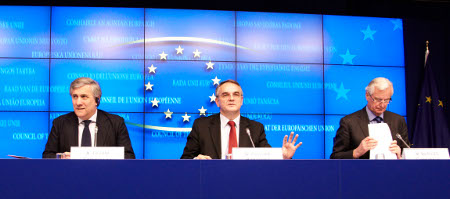
Mr Antonio TAJANI, Vice President of the European Commission (left) - Mr Waldemar PAWLAK, Polish Deputy Prime Minister and Minister for Economy, President of the Energy Council - Commissioner Michel BARNIER
Yesterday, the first day of the 3133rd Council meeting in the Competitiveness configuration (Internal Market, Industry, Research and Space) was held in Brussels under the EU Presidency, chaired by Mr Waldemar PAWLAK, Deputy Prime Minister and Minister of Economy of Poland. Document 18115/11 conveys a press release saying :
Continue reading »
Today, the EU Council published a packed agenda (MEMO/11/864) for the meeting of the Competitiveness Council under the current Polish Presidency on Monday and Tuesday next week in Brussels (see webcast). Further, this background note tells us that the Council will “examin[e the] files related to the creation of unitary patent protection and of a unified patent litigation system” in the afternoon of Monday 5th.
Since more than a decade all important bodies of national states as well as of the European Union do have a website of their own. This is partially welcomed by broad circles of clerks as well as of politicians because of such website can well be utilised as a showcase for press releases and other advertising-style material. On the other hand, such technical means can as well be used to facilitate the inspection of internal documents by the general public, and this is something not everyone likes because of sharing internal documents in many cases also means sharing some of the power conferred by the office.
Not long ago I posted an article based on certain documents of the Committee on Legal Affairs (JURI) of the European Parliament. Since then, obviously a relaunch of the entire website of the European Parliament has happened. Guess what now works and what not:
Continue reading »
Today, in the Court of Justice of the European Union the Opinion of Advocate General BOT concerning Case C‑307/10 has been delivered (Chartered Institute of Patent Attorneys v Registrar of Trade Marks (Reference for a preliminary ruling brought by the Person Appointed by the Lord Chancellor under Section 76 of the UK Trade Marks Act 1994, on Appeal from the UK Registrar of Trade Marks, submitted by the High Court of Justice of England and Wales (United Kingdom)).
What is the matter?
Continue reading »
Warsaw, December 22, 2011: The Day Of Initialling The EU Unified Patent Court
Document 17539/11 authored by the Polish EU Presidency, titled Draft Agreement on the creation of a Unified Patent Court – Guidance for future work and directed to Permanent Representatives Committee ( COREPER Part 1) unveils under item 11 thereof:
The Presidency announced its intention to organise the initialling ceremony whereby the text of the Agreement could be finalised in Warsaw on 22 December 2011. The Presidency considers that the Member States should be able to arrive at a political agreement on the text of the Agreement at the meeting of the Competitiveness Council on 5 December 2011 on the basis of this set of compromise proposals, despite the fact that some issues of political importance could be left to be agreed at a later stage, but before the signature of the Agreement.
Well this appears to be quite big an issue. Why? Well, … in Document 16741/11 titled Draft agreement on a Unified Patent Court and draft Statute – Revised Presidency text we see current wording of Article 5 (1a) printed as follows:
(1a) The central division shall have its seat in [...]. The contracting Member State hosting the central division shall provide the necessary facilities for that purpose.
And, in a corresponding way, current wording of Article 7 (4) reads:
(4) The Court of Appeal shall have its seat in [...].
It is to be understood that the the initialling ceremony scheduled to happen in Warsaw on December 22 would be pointless if there isn’t a finalsed text of the entire Agreement ready for signing .. without those ellipsis in Articles 5 (1a) and 7 (4).
With other words: A political decision as to how to locate the seat of central portions of the UPC system is due to well ahead of the planned ceremony in Warsaw. For more details on the timetable, see also Volker Metzler’s post on visaepatentes.com.
Continue reading »
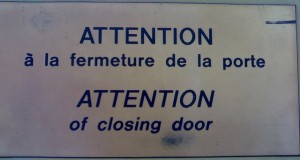 As reported earlier on this blog (see here), the EU Commission is giving high priority to implementing the Unitary Patent and related Unified Patent Court System, in fact, “the objective is to reach agreement on a new patent system by the end of the year” (see MEMO/11/643).
As reported earlier on this blog (see here), the EU Commission is giving high priority to implementing the Unitary Patent and related Unified Patent Court System, in fact, “the objective is to reach agreement on a new patent system by the end of the year” (see MEMO/11/643).
In one of our latest articles, we reported that European executive authorities are now, as the end of the year approaches, “rushing to set up the EU Unified Patent Court“. (see Document 17317/11). But also the legislative authorities in charge – the European Parliament and its Legal Affairs Committee “JURI” – are heavily involved, as has been reported on this blog either (see here or here).
However, as the Executive (i.e. the European Commission and Council) can only suggest a new or amended piece of law, a parliamentary process that may be required to put the law in force might be longish and troublesome - especially if a self-confident Parliament has to decide on a controversial and rarely used legal institution as enhanced cooperation in case of the implementation of the Unitary Patent. As the Unified Patent Court system will be implemented by international agreement between 25 EU member states (EU27 except Spain and Italy), the EU Parliament will not have to adopt a formal position on that issue. Nevertheless, Klaus-Heiner Lehne, Rapporteur of the JURI Committee came up with a Draft Report on a jurisdictional system for patent disputes (2011/2176 (INI)), as reported here.
To ensure that broad discussions and public comments would not endanger the ambitious time schedule for reaching an agreement, the three Rapporteurs of the the JURI Committee – Bernhard Rapkay (S&D, Germany), Raffaele Baldassarre (EPP, Italy), Klaus-Heiner Lehne (EPP, Germany) – have been equipped on 22 November 2011 with a mandate (see agenda, nos. 33, 34, 35) to negotiate the agreement on the Unitary Patent and the related Language Regime with the European Council in back rooms behind closed doors. (see e.g. press release as well as press reports [1] and [2]).
The k/s/n/h::law blog
Some of the patent attorneys of the KSNH law firm have joined their efforts to research what is going on in the various branches of IP law and practice in order to keep themselves, their clients as well as interested circles of the public up to date. This blog is intended to present results of such efforts to a wider public.
Blog Archives
- November 2013 (2)
- October 2013 (1)
- September 2013 (1)
- August 2013 (2)
- July 2013 (3)
- June 2013 (5)
- March 2013 (5)
- February 2013 (4)
- January 2013 (5)
- December 2012 (5)
- November 2012 (5)
- July 2012 (5)
- June 2012 (8)
- May 2012 (5)
- April 2012 (3)
- March 2012 (4)
- February 2012 (5)
- January 2012 (6)
- December 2011 (12)
- November 2011 (9)
- October 2011 (9)
- September 2011 (4)
- August 2011 (7)
- July 2011 (4)
- June 2011 (1)
Blog Categories
- business methods (6)
- EPC (7)
- EPO (12)
- EU law (92)
- ACTA (8)
- CJEU (4)
- Comitology (1)
- competition law (2)
- Enforcement (6)
- EU Unified Patent Court (62)
- FTA India (1)
- TFEU (2)
- Trade Marks (5)
- European Patent Law (37)
- German Patent ACt (PatG) (1)
- German patent law (5)
- Germany (6)
- Pirate Party (3)
- International Patent Law (4)
- PCT (2)
- IP politics (10)
- licenses (2)
- Litigation (5)
- Patentability (7)
- Patents (12)
- Piratenpartei (2)
- Software inventions (10)
- Uncategorized (9)
- Unitary Patent (24)
- US Patent Law (4)
Comments
- kelle on Germany: Copyright Protection More Easily Available For Works Of “Applied Arts”
- Time Limits & Deadlines in Draft UPCA RoP: Counting The Days - KSNH Law - Intangible.Me on Wiki Edition of Agreement on Unified Patent Court Agreement (UPCA)
- Time Limits & Deadlines in Draft UPCA RoP: Counting The Days | ksnh::law on Wiki Edition of Agreement on Unified Patent Court Agreement (UPCA)
- Wiki Edition of Agreement on Unified Patent Cou... on Wiki Edition of Agreement on Unified Patent Court Agreement (UPCA)
- European Commission Takes Next Step Towards Legalising Software Patents in Europe | Techrights on EU Commission publishes Proposal of amendend Brussels I Regulation for ensuring Enforcement of UPC Judgements
Blogroll
- 12:01 Tuesday
- America-Israel Patent Law
- Anticipate This!
- AwakenIP
- BlawgIT
- BLOG@IPJUR.COM
- BP/G Radio Intellectual Property Podcast
- Broken Symmetry
- Class 46
- Director's Forum: David Kappos' Public Blog
- Gray on Claims
- I/P UPDATES
- IAM Magazine Blog
- Intellectual Property Intelligence Blog
- IP Asset Maximizer Blog
- IP CloseUp
- IP Dragon
- IP Watch
- IP Watchdog
- IPBIZ
- ipeg
- IPKat
- ITC 337 Law Blog
- Just a Patent Examiner
- K's Law
- MISSION INTANGIBLE
- Patent Baristas
- Patent Circle
- Patent Docs
- Patently Rubbish
- PatentlyO
- Patents Post-Grant
- Reexamination Alert
- SPICY IP
- Tangible IP
- The 271 Patent Blog
- The Intangible Economy
- THE INVENT BLOG®
- Think IP Strategy
- Tufty the Cat
- Visae Patentes
The KSNH blogging landscape


This blog and the German-language sister blog k/s/n/h::jur link to the two popular and privately run blogs IPJur und VisaePatentes and continue their work and mission with a widened scope and under the aegis of our IP law firm.
ksnhlaw on Twitter
- No public Twitter messages.
 KSNH::JUR Feed (german)
KSNH::JUR Feed (german)- Ist Verschlüsselung passé? September 6, 2013Auf verschiedenen Feldern beruflicher Praxis ist dafür zu sorgen, dass Kommunikation vertraulich bleibt. Die trifft beispielsweise für Ärzte zu, aber auch für Anwälte, darunter auch Patentanwälte. Einer der zahlreichen Aspekte, die in diesem Zusammenhang eine Rolle spielen, ist die Technik, um die Vertraulichkeit beruflicher Kommunikation sicherzustellen. Wa […]
- EU-Einheitspatent: Demonstrativer Optimismus und Zahlenmystik allerorten – Naivität oder politische Beeinflussung? June 26, 2013Nach mehreren vergeblichen Anläufen zur Schaffung eines EU-weiten Patentsystems wurde 1973 als Kompromiss das Europäische Patentübereinkommen unterzeichnet, welches unabhängig von der seinerzeit noch EWG genannten Europäischen Union System zur zentralisierten Patenterteilung mit nachgeordnetem Einspruchsverfahren durch das Europäische Patentamt schuf. Wie wi […]
- Moderne Zeiten oder: DPMA und Patentgericht streiten über die elektronische Akte April 25, 2013Bekanntlich hat das Deutsche Patent- und Markenamt (DPMA) im Jahre 2013 mit der rein technischen Fertigstellung der Einrichtungen zur elektronischen Akteneinsicht einen wichtigen Meilenstein seines Überganges von der Papierakte zur “elektronischen Akte” erreicht. Im DPMA werden aber bereits seit dem 01. Juni 2011 Patente, Gebrauchsmuster, Topografien und erg […]
- Gutachten zu Forschung, Innovation und technologischer Leistungsfähigkeit Deutschlands 2013 March 11, 2013Unter dem Datum vom 28. Februar 2013 ist die Bundestags-Drucksache 17/12611 veröffentlicht worden Sie trägt den Titel Unterrichtung durch die Bundesregierung - Gutachten zu Forschung, Innovation und technologischer Leistungsfähigkeit Deutschlands 2013. Die Bundesregierung legt dem Deutschen Bundestag seit dem Jahr 2008 […]
- 3D-Printing: Zum Filesharing von 3D-Modelldaten February 25, 2013In meiner kleinen zuvor angekündigten Reihe über rechtliche Aspekte des 3D Printing komme ich heute auf die Frage zu sprechen, ob die Hersteller von Gerätschaften es hinnehmen müssen, wenn Ersatztreile davon – vom Brillengestell über Smartphone-Gehäuseteile bis hin zu Rastenmähermotor-Abdeckungen – gescannt und die daraus […]
- Ist Verschlüsselung passé? September 6, 2013



